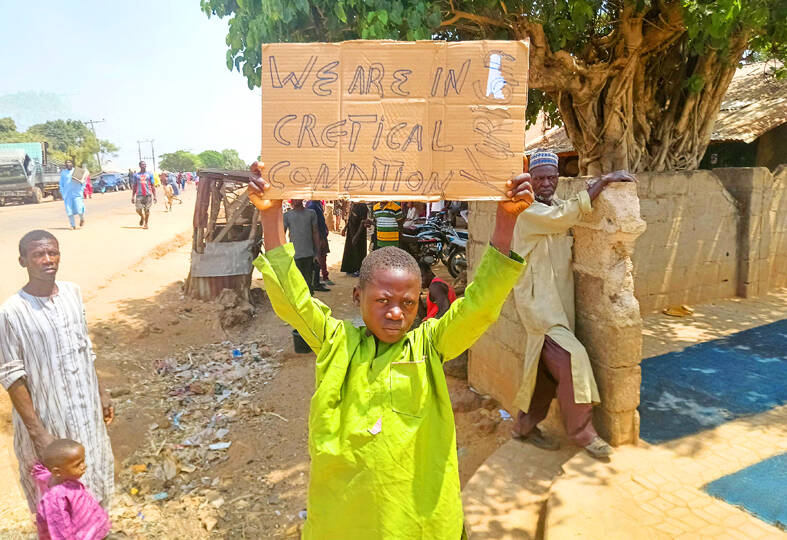Seven-year-old Safiya Kuriga complained she was feeling feverish, but her mother still made her attend class on Thursday. Within two hours, gunmen entered her school and kidnapped Safiya and about 300 other students in Nigeria’s northern Kaduna State.
“I forced her to go to school that morning despite her complaining to me of a fever,” a sobbing Khadiya Kuriga said by telephone from the town of Kuriga. “We have been crying since yesterday. Our children are hungry.”
Nigerian President Bola Ahmed Tinubu on Friday ordered troops to rescue kidnapped students.

Photo: Reuters
Gunmen seized more than 300 primary and secondary school children between the ages of seven and 15, school authorities and parents said.
Some students were later released while a few others escaped, leaving at least 286 missing, said Salisu Abubakar, a teacher at the Local Government Education Authority School.
No one has claimed responsibility for the kidnappings, the first mass school abduction in Nigeria since July 2021, when gunmen seized some 150 children.
Tinubu said he had directed security and intelligence agencies to rescue the children “and ensure that justice is served against the perpetrators.”
“I have received briefing from security chiefs on the two incidents, and I am confident that the victims will be rescued,” he said in a statement. “Nothing else is acceptable to me and the waiting family members of these abducted citizens. Justice will be decisively administered.”
Thirteen-year-old Aminu Abdullahi said the armed men numbered about 50 and were shooting in the air when they entered the school.
He was lucky as he ran into the bush to hide until the gunmen left with many of his schoolmates.
Sani Muazu’s eight-year-old son Ali also escaped, but not after he was taken deep into the bush by the kidnappers.
The young boy was in class when armed men stormed in and ordered everyone to follow them, his father said.
Before he knew what was happening, Ali was walking barefoot in the bush with dozens of others, followed by the gunmen, he said.
“My son did not know how many they were, but he said they were many. They were crying of hunger, exhaustion and dehydration,” Muazu said.
When darkness fell, the children were made to sleep in a large clearing in the forest and Ali took an opportunity to escape.
“That was how my son managed to escape and walked back home throughout the night. We just saw him arrive early this morning and we are grateful to God,” Muazu said.
Additional reporting by AFP

REVENGE: Trump said he had the support of the Syrian government for the strikes, which took place in response to an Islamic State attack on US soldiers last week The US launched large-scale airstrikes on more than 70 targets across Syria, the Pentagon said on Friday, fulfilling US President Donald Trump’s vow to strike back after the killing of two US soldiers. “This is not the beginning of a war — it is a declaration of vengeance,” US Secretary of Defense Pete Hegseth wrote on social media. “Today, we hunted and we killed our enemies. Lots of them. And we will continue.” The US Central Command said that fighter jets, attack helicopters and artillery targeted ISIS infrastructure and weapon sites. “All terrorists who are evil enough to attack Americans are hereby warned

‘POLITICAL LOYALTY’: The move breaks with decades of precedent among US administrations, which have tended to leave career ambassadors in their posts US President Donald Trump’s administration has ordered dozens of US ambassadors to step down, people familiar with the matter said, a precedent-breaking recall that would leave embassies abroad without US Senate-confirmed leadership. The envoys, career diplomats who were almost all named to their jobs under former US president Joe Biden, were told over the phone in the past few days they needed to depart in the next few weeks, the people said. They would not be fired, but finding new roles would be a challenge given that many are far along in their careers and opportunities for senior diplomats can

Seven wild Asiatic elephants were killed and a calf was injured when a high-speed passenger train collided with a herd crossing the tracks in India’s northeastern state of Assam early yesterday, local authorities said. The train driver spotted the herd of about 100 elephants and used the emergency brakes, but the train still hit some of the animals, Indian Railways spokesman Kapinjal Kishore Sharma told reporters. Five train coaches and the engine derailed following the impact, but there were no human casualties, Sharma said. Veterinarians carried out autopsies on the dead elephants, which were to be buried later in the day. The accident site

RUSHED: The US pushed for the October deal to be ready for a ceremony with Trump, but sometimes it takes time to create an agreement that can hold, a Thai official said Defense officials from Thailand and Cambodia are to meet tomorrow to discuss the possibility of resuming a ceasefire between the two countries, Thailand’s top diplomat said yesterday, as border fighting entered a third week. A ceasefire agreement in October was rushed to ensure it could be witnessed by US President Donald Trump and lacked sufficient details to ensure the deal to end the armed conflict would hold, Thai Minister of Foreign Affairs Sihasak Phuangketkeow said after an ASEAN foreign ministers’ meeting in Kuala Lumpur. The two countries agreed to hold talks using their General Border Committee, an established bilateral mechanism, with Thailand